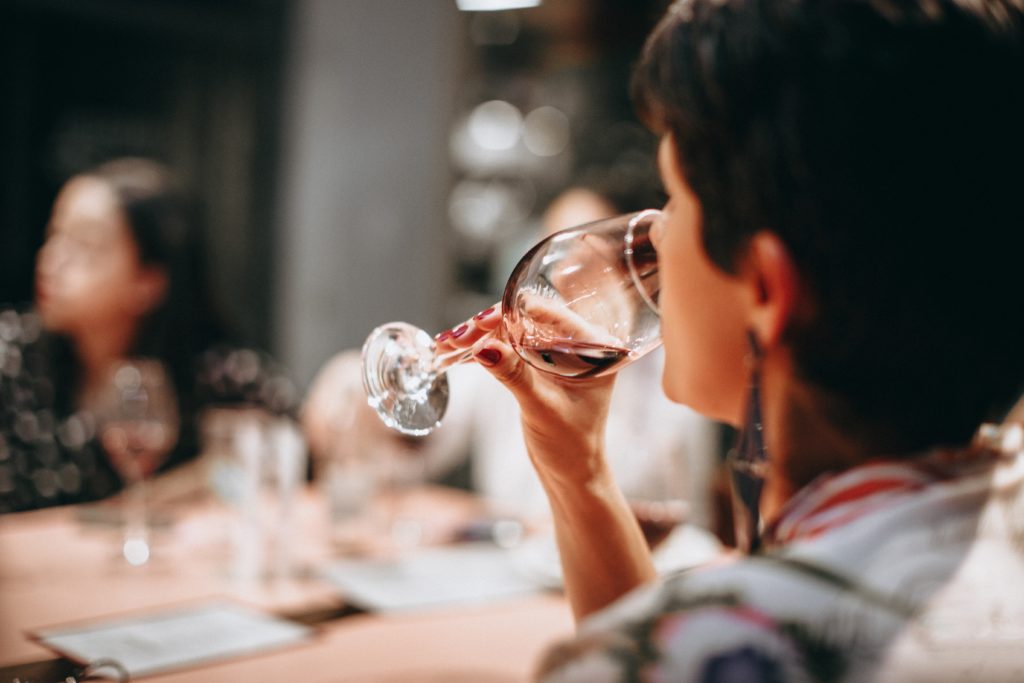
After a long day, it may be tempting to have a glass of wine or three to help you unwind. Pair that with the common misconception that your nightcap will help you catch forty winks, and there’s your recipe for disaster. Long story short, alcohol and sleep don’t mix, folks.
While most people who imbibe late at night may find that they fall asleep quickly, a 2020 survey from the American Academy of Sleep Medicine (AASM) showed as much as 68 percent of Americans have actually lost sleep due to drinking alcohol past bedtime. (1) Why? Well, new research out of the Sleep Research Laboratory at E.P. Bradley Hospital in Providence, RI, definitively shows that those late-evening drinks are indeed messing with your sleep. (2)
For the study, researchers collected in-lab polysomnography results of thirty adult participants who drank either a mixer only or a mixer with alcohol. Researchers and participants targeted a breath alcohol concentration (BrAC) of 0.08 mg/L, and drinking ended one hour before lights out.
Ultimately, researchers found that alcohol before sleep dramatically affects sleep architecture (the structural organization of sleep and how you move through sleep stages one, two, three, and four). (3) Polysomnography results showed that alcohol significantly decreases the time spent in REM sleep and increases slow-wave sleep (SWS) during the first third of the night. We’ll add here that the research doesn’t show that alcohol affects the total amount of slow-wave sleep.
The Lure of Alcohol Come Bedtime
Alcohol is an incredibly popular sleep aid — because it creates an intended outcome. Dr. Robert Oexman, President and Founder at Somly, tells Sleepopolis, “Alcohol has a sedative effect which can decrease anxiety and make it easier to fall asleep.” (2) He adds,” The effects are immediate, rewarding the sleeper with perceived good sleep. The unfortunate side effect is reduced REM sleep later in the night” (as this latest study shows).
Oexman goes on to explain that poor sleep after drinking is “due to an agitation phase that occurs approximately 2 to 3 hours after we consume alcohol.” Essentially, the “benefits” of the alcohol’s sedative effect begin to unravel as our bodies metabolize the alcohol. Oexman adds, “For a portion of the population, they do not remember the changes that happen in sleep later in the night, which only reinforces the reward mechanism.”
The Problem With Alcohol at Bedtime
When we say things begin to unravel, we’re talking about the results of this latest study: alcohol before bed leads to less time in REM sleep and more slow-wave sleep earlier in the night.
Oexman reminds us, “We spend approximately 25 percent of the night in deep sleep (SWS), 25 percent in REM sleep, and 50 percent of the night in light stages of sleep, and each stage of sleep has benefits for our brain and body health.” (4) Ultimately, spending less time in specific sleep stages can have a profound impact on our physical and mental health.
First, when we don’t spend enough time in REM sleep, we are likely to see a host of changes in our cognition. According to Oexman, diminished time in REM sleep can lead to (5)
- Changes in brain development (newborns spend most of their time sleeping in REM sleep)
- Impaired ability to learn
- Decreased creativity
- Impaired ability to store memories and recall memories
And while he notes that “all stages of sleep are necessary for good health, Oexman says deep sleep [or slow wave sleep] offers specific physical and mental benefits.” Beyond releasing growth hormone and repairing muscles, bones, and tissue, he adds, “Deep sleep is important for cognitive function and memory and is thought to play a role in language learning, motor skills, and the developing brain.” (6) Moreover, Oexman notes, “The glymphatic system in our brain is more active in deep sleep. This is the system that flushes toxins from our brain by increasing the amount of cerebral spinal fluid that moves through our brain.” (7) That could mean that getting enough deep sleep to encourage this process may be the key to reducing cognitive decline as we age.
And finally, using alcohol for sleep can be problematic because “People build up a tolerance to alcohol,” says Oexman. “They may not show the impact of alcohol in their behaviors, but it still has the same level in their blood.” Oexman adds, “People who do not drink as often can get sleepier on less alcohol than someone who has developed a tolerance. Therefore, if people are using alcohol to fall asleep [regularly], they will have to consume more alcohol over time to get the same response.”
How to Keep Alcohol From Messing With Your Zzzs
To keep alcohol from messing with your sleep, Oexman suggests “limiting alcohol to one to two drinks at dinner time, provided you have dinner three to four hours before sleep onset.”
Beyond knowing when to say when, he suggests drinking plenty of water (ideally one glass of water for every alcoholic beverage you drink) and eating before you drink.
How to Unwind Without Alcohol
If potent potables are how you decompress at the end of the day, there are other things you can do to unwind. However, Oexman cautions that you should mind your timing.
He says, “It is best not to start winding down too early in the evening. A large number of my patients who suffer from insomnia prepare for bed too early. They come home from work, refuse to get on electronics, close window shades, put on blue blocker eyeglasses, and hope they will be ready for sleep four hours later. This is a poor idea since your circadian rhythm is not ready to prepare for bed that early, and your sleep drive is insufficient at that time. You are better off staying physically and mentally active all evening.”
And when it’s time to get ready for bed, Oexman says a little good sleep hygiene goes a long way: “Thirty minutes to one hour before laying down to sleep is a good time to begin turning off electronics, dimming lights, and engaging in an activity that you find relaxing (hobbies, stretching, light reading, coloring, crocheting)” he says. “If you are not sleepy when it is your normal time to lay down for sleep, continue your relaxing activity, but do not change your wake time no matter how long it takes to fall asleep.”
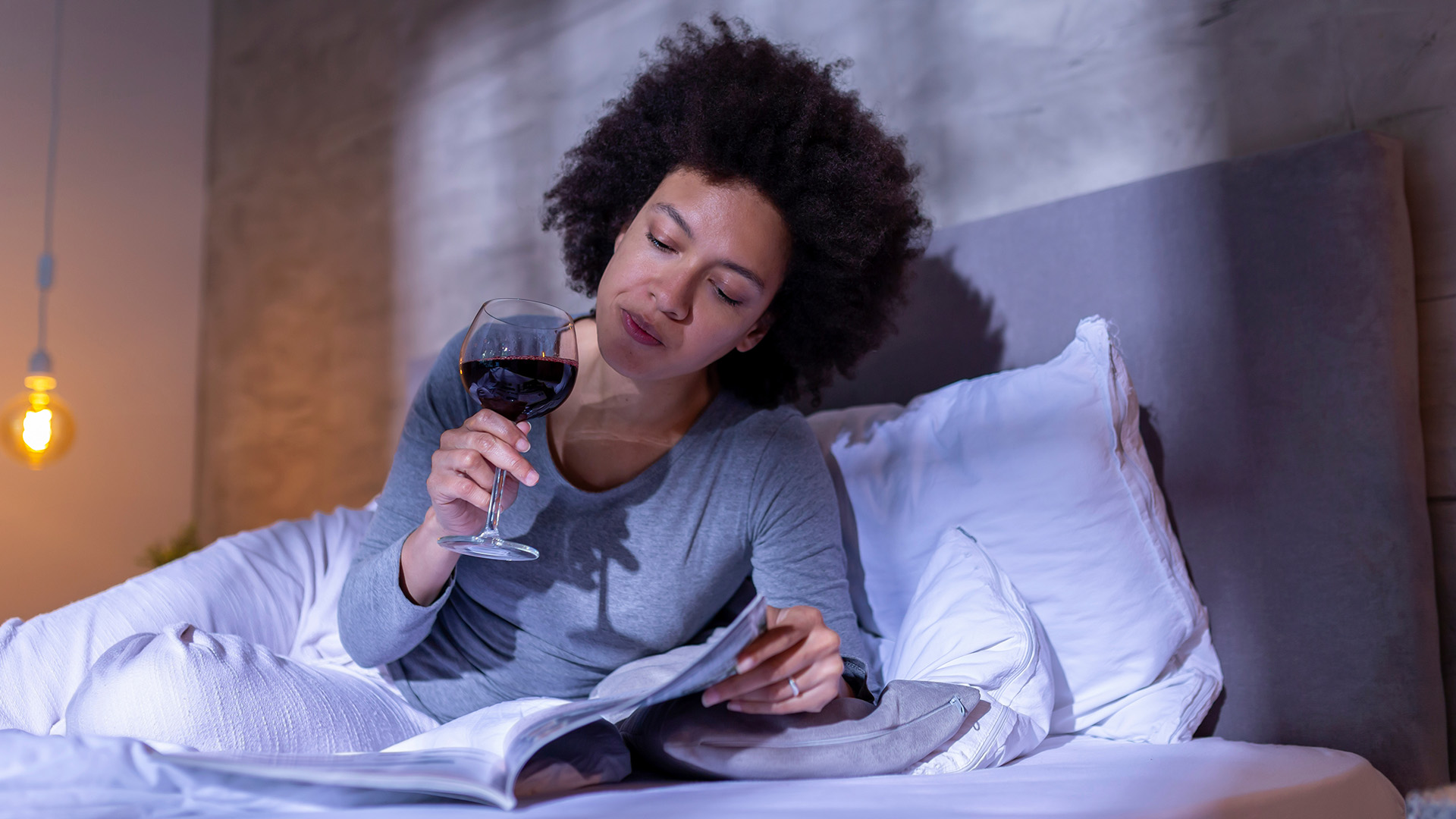
Alcohol and Sleep
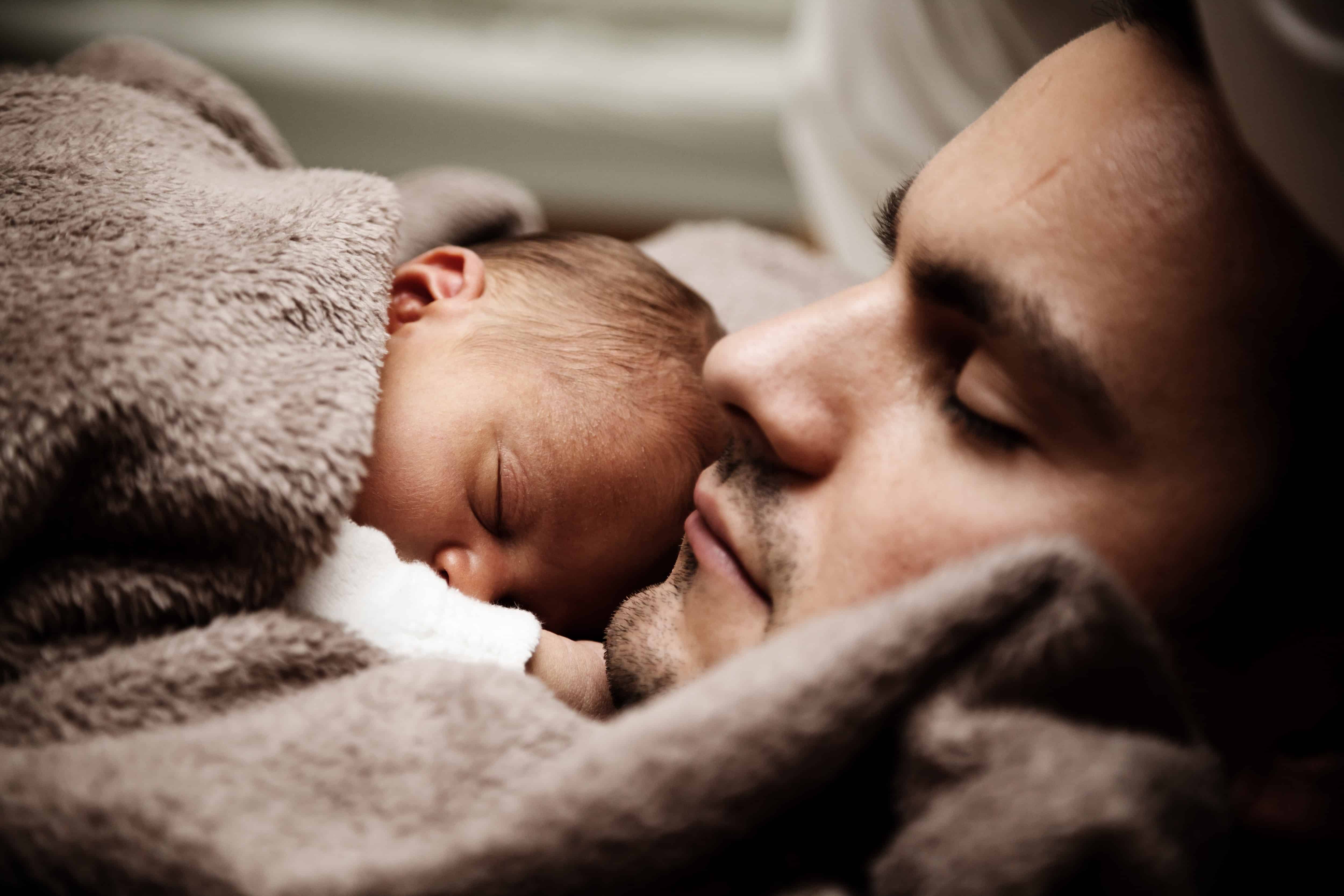
How Sleep Changes As We Age
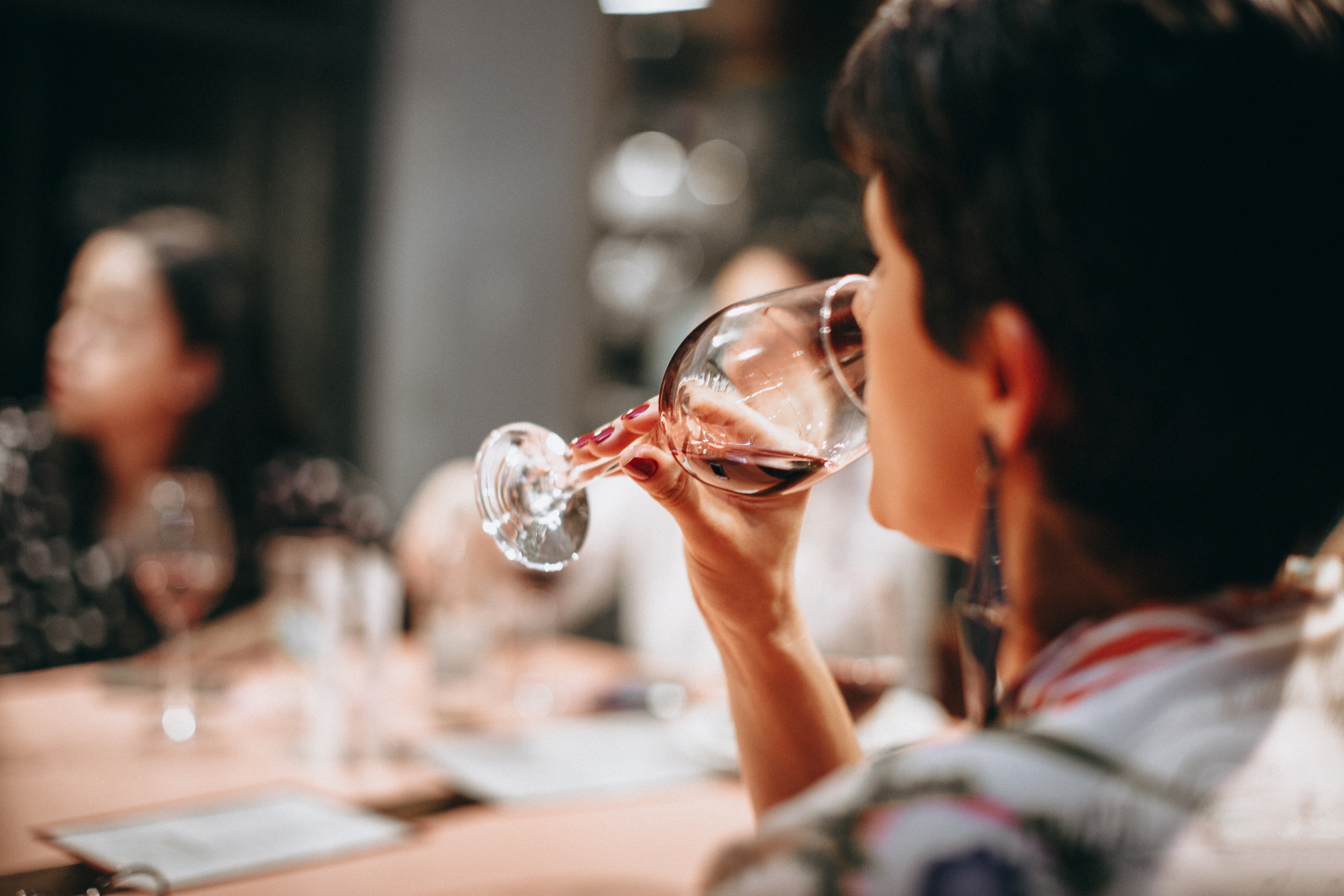
Just Two Glasses of Wine Could Hurt Sleep, Study Says
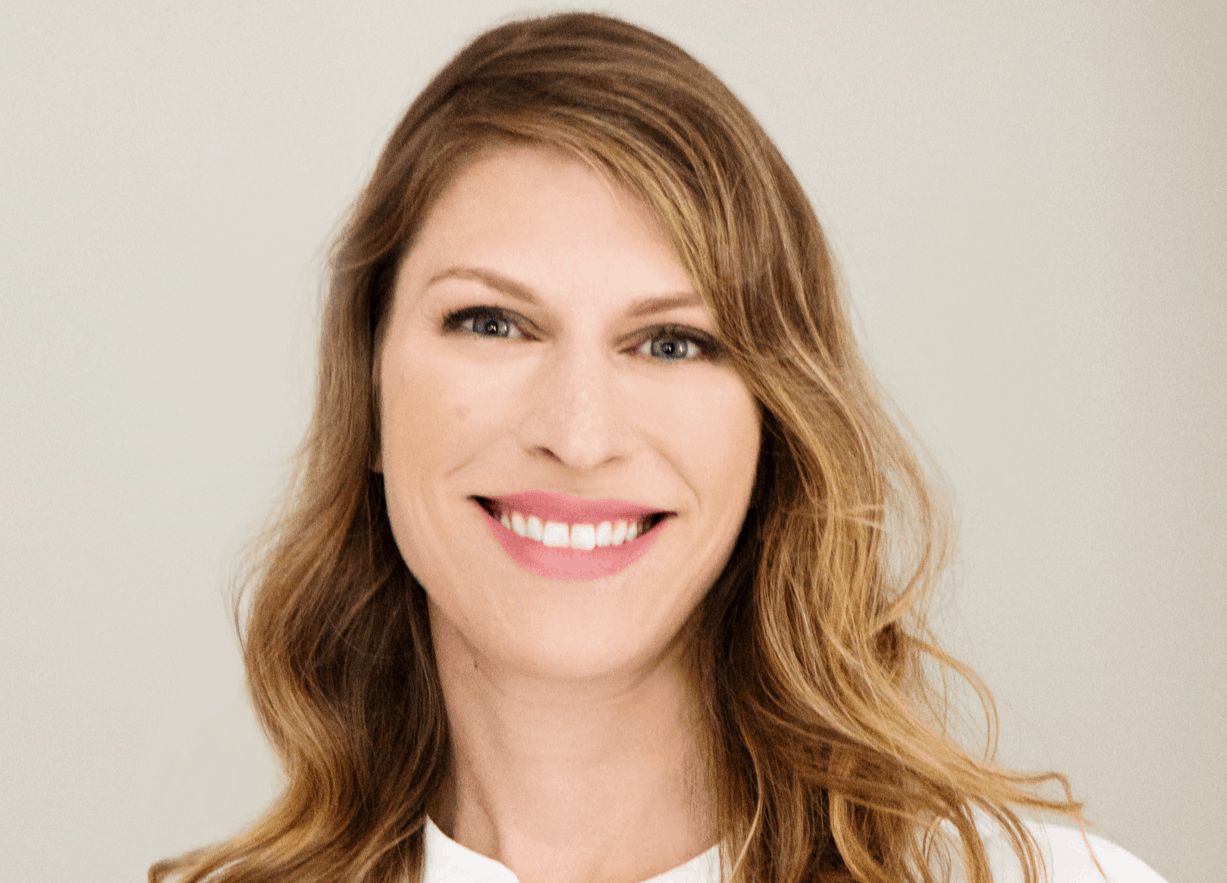
Bedtime Do’s (and Major Don’ts) with Sleep Specialist Dr. Shelby Harris
Sources
1. (2020) American Academy of Sleep Medicine. Sleep Prioritization Survey Drinking Alcohol Past Bedtime. https://aasm.org/wp-content/uploads/2020/11/sleep-prioritization-survey-2020-drinking-alcohol-past-bedtime-results.pdf
2. McCullar, Katie S.; Barker, David H.; McGeary, John E.; Saletin, Jared M.; Gredvig-Ardito, Caroline; Swift, Robert M.; Carskadon, Mary A.; “Altered sleep architecture following consecutive nights of presleep alcohol,” Sleep, 2024;, zsae003, https://doi.org/10.1093/sleep/zsae003
3. Institute of Medicine (US) Committee on Sleep Medicine and Research; Colten HR, Altevogt BM, editors. Sleep Disorders and Sleep Deprivation: An Unmet Public Health Problem. Washington (DC): National Academies Press (US); 2006. 2, Sleep Physiology. Available from: https://www.ncbi.nlm.nih.gov/books/NBK19956/
4. Patel AK, Reddy V, Shumway KR, et al. Physiology, Sleep Stages. [Updated 2024 Jan 26]. In: StatPearls [Internet]. Treasure Island (FL): StatPearls Publishing; 2024 Jan-. Available from: https://www.ncbi.nlm.nih.gov/books/NBK526132/
5. Peever J, Fuller PM. Neuroscience: A Distributed Neural Network Controls REM Sleep. Curr Biol. 2016;26(1):R34-R35. doi:10.1016/j.cub.2015.11.011
6. Roth T. Slow wave sleep: does it matter? J Clin Sleep Med. 2009;5(2 Suppl): S4-S5.
7. Makin, S. (2024, February 20). Deep sleep gives your brain a deep clean. Scientific American. https://www.scientificamerican.com/article/deep-sleep-gives-your-brain-a-deep-clean1/
8. Oexman, Robert. Author interview. March 7, 2024.


























